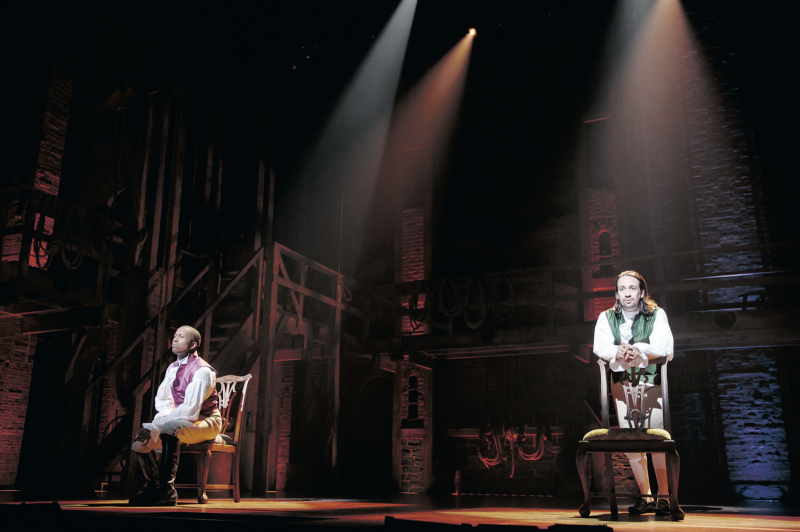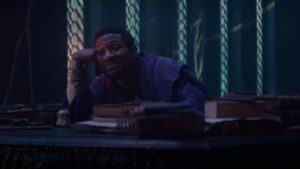“Raise a Glass to Freedom”: The “Hamilton” Film Review

From left to right, Aaron Burr (Leslie Odom, Jr.) and Alexander Hamilton (Lin-Manuel Miranda). Photo courtesy of the Hamilton Twitter account.
Written by Brandon C. Kesselly (@bckesso)
“Raise a glass to freedom
Something they can never take away
No matter what they tell you…” — Alexander Hamilton, John Laurens, Hercules Mulligan, and Marquis de Lafayette, “The Story of Tonight”
You’d be hard-pressed to find an American who had no idea what Hamilton is. It would be easier to stump them on who Hamilton is, or rather was. But over the last five years, Lin-Manuel Miranda’s award-winning 2015 Broadway musical, based on a 2004 biography of Alexander Hamilton, has made a larger impact on the cultural zeitgeist than one may have predicted. Aside from the live production, the hip-hop opera has spawned a Grammy Award-winning cast album, a hip-hop mixtape, and now, a live recording of the play — released to Disney+ 15 months (and 12 days) ahead of schedule due to COVID-19.
What’s made Hamilton last so long in an attention-starved era has been the aforementioned omnipresence of its music. But seeing and hearing it live just “hits different.” The music feels fresher, more real, and the visuals of the performers, sets, and costumes really complete the experience alongside the audience reactions. Leslie Odom, Jr. is magnificent as Aaron Burr, the ambitious, calculating, complicated foil to Miranda’s titular impatient, exuberant “ten dollar Founding Father.” The tragic tale of these two men carries the production, where Burr identifies himself as the “damn fool that shot” his old friend and colleague in the opening number. While Miranda is not the best singer, he sings with a gentle earnestness and makes up for his voice with very enthusiastic rapping. Meanwhile, Odom Jr. is talented at both, stealing the show in numbers like “Wait For It”, “Dear Theodosia”, and “The Room Where It Happens” while adding a playful element to “The Schulyer Sisters” and powerful delivery as the show’s narrator.
Jonathan Groff is well-cast as King George III, performing his three maniacal songs as if he was the estranged, abusive lover to the blossoming United States. Renée Elise Goldsberry and Daveed Diggs gave standout performances as well. Goldsberry’s Angelica Schulyer is witty, self-aware, and dutiful as the de facto matriarch of the family, leading to scene-stealing singing and rapping in both “The Schuyler Sisters” and “Satisfied.” Diggs’ performances as Marquis de Lafayette (Act I) and Thomas Jefferson (Act II) place him in two pivotal roles centered around France, but he makes both feel unique and vibrant. His Jefferson, in particular, is charming, yet conniving, similar to a Petyr Baelish (Game of Thrones) or Scar (The Lion King), which comes out during both “Cabinet Battle” songs as well as “Washington On Your Side.” Speaking of Mr. Washington, Christopher Jackson brings a fatherly confidence and stability to his role as the nation’s first president, carefully balancing the dichotomy of war veteran (“Right Hand Man”) and statesman (“Cabinet Battle #1”, “Cabinet Battle #2”). Jackson’s duet with Miranda, “One Last Time”, is heartwarming as the two characters discuss Washington’s transition and eventual farewell address.
The true beauty of the production, however, is the cinematography and editing. Proper attention is given to the stars of the music, yet the dancers also get their due. Duets have the appropriate focus, too, as the soloists get close-ups and wider shots capture both singers. It may seem strange to praise cinematography for a stage play recording, but this can truly influence the perception of a play to a screening audience versus those in actual attendance. Visual transitions are solid and nothing feels choppy. The live instrumentation adds another layer of depth to the package, and many of the edits play into the tension of the music.
My only true criticism of the film, and of the production as a whole, is that the female characters have very little exploration and seemingly exist to either showcase Hamilton’s virtues or his vices. Despite an endearing performance by Philippa Soo as Eliza Hamilton (née Schuyler), Hamilton’s wife, we learn little of her story until the very end, unlike eventual Vice President Burr. Hell, we learn more about her elder sister, Angelica, yet Eliza was apparently a more important figure.
There’s not much else to say about Hamilton. As this is effectively a modern opera, there is very little acting to truly critique since the story is told exclusively through the music. But the music is powerful, and the story of one of the nation’s Founding Fathers, with an extremely diverse cast, highlights the beauty of the legacy they entrusted us all to perfect. Hamilton showcases both the price of freedom and its benefits. What better way to spend a few hours on Independence Day than watching it?
If you’re curious about some of the music that inspired this production, please see Lin-Manuel Miranda’s HAMthology Playlist and the official playbill below.
HAMthology
Playbill
Hamilton, June 26-28, 2016 Program
Want to keep up with PubSquare Media? Follow us on Facebook, Twitter, and Instagram!



